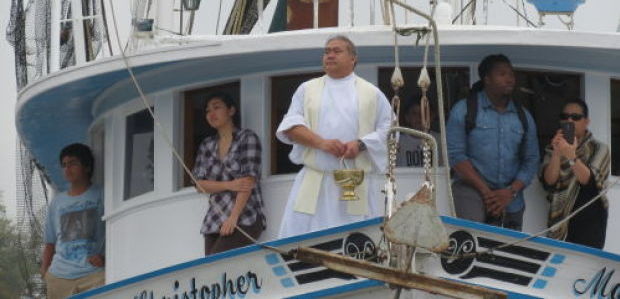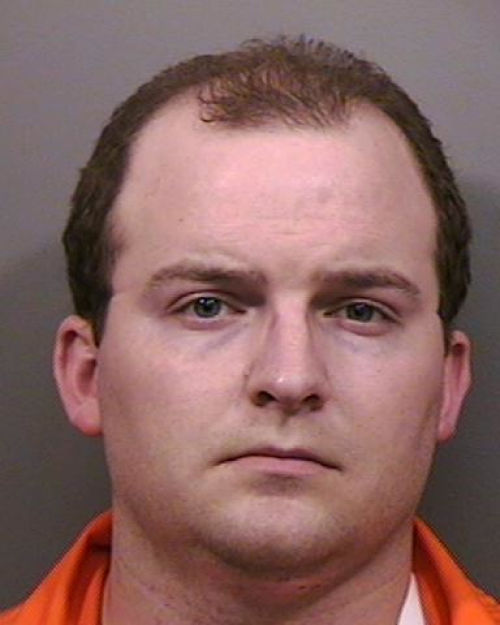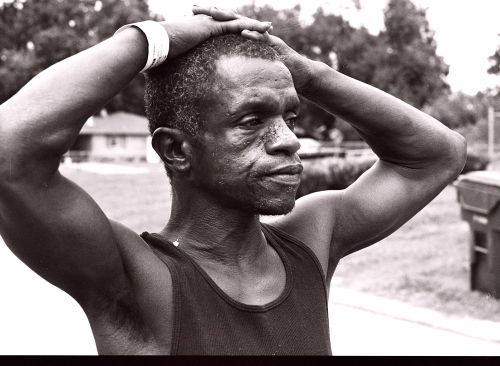
Living Act of Faith: Weather threat doesn’t halt local tradition
April 8, 2014
Attorney: Sanity never considered
April 8, 2014“Because it was dark,” Ronald Dominique can meekly be heard telling detectives.
The local serial killer chose random, dark locations to dispose of 23 men after he raped and murdered them between 1997 and 2006.
Detectives said Dominique targeted victims along La. Highway 182 near low budget motels known for drugs and prostitution, as well as the Mechanicville neighborhood in East Houma. The depth of his murders reached as far as New Orleans and several other parishes: St. Charles, Jefferson, Lafourche, Assumption and Iberville.
While Dominique’s murder sequence qualifies him as one of the nation’s most prolific serial killers, some believe the case was centered too far south to gain national media attention.
“Bayou Blue,” a documentary released this week, gives several of the victims’ families the opportunity to voice their emotions and brings attention to the case described as “forgotten.”
Alix Lambert, one of the film’s directors, said the location of the case in south Louisiana dealt with complicated issues such as homophobia with the idea of a gay serial killer who targeted victims associated with poverty or drugs. The time frame surrounding his arrest was also in the shadow of Hurricane Katrina, which made it difficult for the case to gain attention.
“My impression as someone who didn’t grow up in the South and was coming there with fresh eyes was that it was extremely complicated,” Lambert said. “People don’t like telling complicated stories, they prefer easy ones.”
She created the film with David McMahon to learn more about the case.
“Twenty-three bodies was a pretty big body count for a serial killer,” Lambert said. “For that story to go pretty much untold for so long, I think it sets it apart from all of the other serial killers in this country.”
Out of 23 victims, Lambert and McMahon were able to get in contact with four families who were willing to speak on camera, while also speaking to Capt. Dawn Foret with the Terrebonne Parish Sheriff’s Office and Capt. David Thornton with the Jefferson Parish Sheriff’s Office.
Foret worked on the case as part of a task force for almost two years. While detectives often have the opportunity to backtrack a victim’s final 24 hours and the people they had contact with, detectives did not have that advantage with the Dominique case.
“The fact that we had little forensic evidence and the fact that the victims generally did not know the suspect complicated the case,” Forest said.
“The majority of victims lived a transient lifestyle, a lot of them were homeless and involved in illegal drug activity. When Dominque came in contact with them, it was mostly on the streets,” she added.
Ricky Wallace was the only victim to escape Dominique, and he tells the story of how he got away in “Bayou Blue,” while offering insight on how the killer lured his victims.
Wallace said Dominique passed him several times in his truck along an East Houma roadway before he stopped and offered him a ride. According to Wallace’s account in the film, Dominique showed him a picture of a fictitious woman.
As with most of his victims, the killer asked if Wallace was interested in sex with a woman and also presented the opportunity for drugs.
Dominique took Wallace to a trailer at 2215 Bayou Blue Road, and told a convincing story that would allow the killer to tie him to the bed lying face down.
“I told him ‘You can talk a hole in your head, I’m not getting tied up,’” Wallace said.
After his friend Chris Deville was murdered, Wallace came forward with details about how he got away the night the serial killer picked him up.
“Without Ricky, maybe it would have taken longer to track the right suspect,” Foret said. “He essentially put us on the right path to the right suspect.”
Dominique was arrested Dec. 1, 2006, at the Bunk House Inn in Houma and confessed to the murders within three hours.
Dominique pleaded guilty to murdering eight men in Terrebonne Parish – Michael Barnett, Kurt Cunningham, Chris Deville, Alonzo Hogan, Leon Lirette, Nicholas Pellegrin, Wayne Smith and August Watkins.
Mark Rhodes, assistant district attorney, said in the film, the death penalty sentence for Dominique would have been less traumatic for the killer as he was petrified of serving time in jail. Dominique was sentenced to eight consecutive life sentences on Sept. 23, 2008 and is serving time in the Louisiana State Penitentiary in Angola.
Albert Barabin, Chris Deville’s father, agreed with Rhodes’ statement in the film.
“I’m the type of guy, if you do wrong, you should pay for it,” he said.
Octavia Jones, Wayne Smith’s grandmother, also agreed. “The way I feel they should let him go (to jail) and suffer.”
For the families of Dominique’s victims, it is an occurrence in their lives that cannot be erased from memory, and as they try to heal, the film brings back memories still too difficult to deal with.
After Dominique’s arrest, people from all over the United States contacted the Terrebonne Parish Sheriff’s Office to report unsolved cases about their loved ones and to determine whether there was any connection to Dominique.
Foret said detectives were not able to connect him with any cases outside of Louisiana.
It has been almost 10 years since authorities tracked Dominique, and Foret has an unblemished memory about her work on the case.
“It doesn’t feel like it’s been that long,” she said. “Because it took so much from the investigators that worked it every day, it still seems fresh.”
“Bayou Blue” was screened at the 24th annual New Orleans Film Festival in October and is available on cable, Video on Demand and DVD for $24.95 on Amazon.
This man, Ricky Wallace, was the only one of the killer’s victims to get free. His tips led authorities to Dominique’s arrest.













